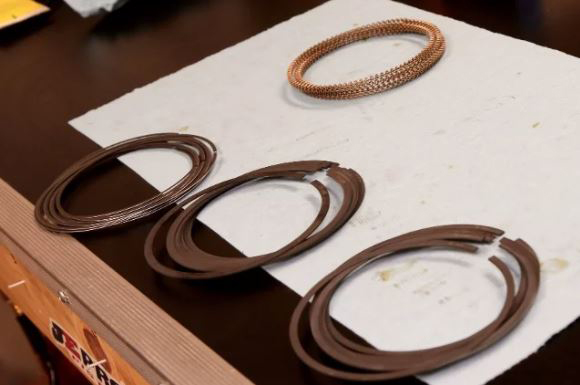
(Image/Wiseco)
Piston rings have a dictionary all to themselves, and it’s important to be familiar with the terms before you begin an engine build.
The piston pros at Wiseco put together this short glossary of important piston ring terminology so you’re in the loop…err…ring, when it’s time to install your pistons.
Piston Ring Glossary of Terms
Axial Clearance
The distance between the ring axial height and the piston ring groove width.
Axial Height
The width (thickness) of the ring in the axial direction.
Back Clearance
Distance between the inside diameter of the ring and the back of the ring groove when the ring is flush with the ring land.
D-Wall
A specification established by the Society of Automotive Engineers (SAE) that dictates the radial width of a standard automotive piston ring using this formula:
D-Wall: Bore diameter divided by 22 = radial thickness
(for example, 3.386″ / 22 =.154″)
End Gap
The end gap clearance when the ring is compressed to the bore diameter.
Gas Nitrided
A process used to harden the perimeter of a ring where nitrogen atoms penetrate the base material and form an extremely hard outer layer that provides excellent wear and scuff resistance.
Neutral Barrel
A term used to describe a piston ring that has no torsional bias or twist.
Positive Twist
An asymmetric change in the ring cross section that causes it to twist in an upward direction (toward the piston crown) aiding ring sealing of the top and bottom of the ring groove. Positive twist is used only on top compression engines.
Reverse Twist
An asymmetric change in the ring cross section causing the ring to twist downward (toward the piston skirt) that enhances the second compression ring’s oil scraping properties.
Radial Width
The ring width in the radial direction.
Ring Axial Sides
The top and bottom surfaces of the ring.
Ring Face
The section that contacts the cylinder wall.
Torsional Twist
The installed position of the ring due to a chamfered area on either ring side that helps the ring cross-seal.





Thank You… Late Info for (3) of my engines..( 429 c.i. Ford,~ 460 c.i. Lincoln, ~140 c.i. Pinto . But Will apply to my next one… 302 Ford… .